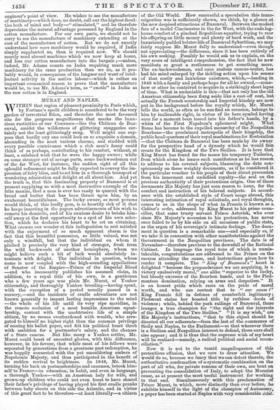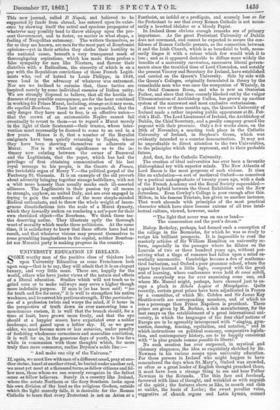MURAT AND NAPLES.
'WITHIN that region of pleasant proximity to Paris which,
ir by Fortune's spoilt children is considered to be the very garden of terrestrial Eden, and therefore the most favoured site for the gorgeous magnificence that marks the luxu- rious rusticities of our Crcesuses—lies the Château de Buz- enval, amidst the wilderness of glittering snuggeries cer- tainly not the least glitteringly snug. Well might one sup- pose that hardly any one could look on so exquisite a domain, abounding in the most various charms, and studded with every possible contrivance which a rich man's fancy could think of as perhaps, contributing to his comfort, without, at least, a subdued wish that he were the happy owner; while on some stranger out of savage parts, some backwoodsman out of the far West, for instance, the sudden sight of all this splendid refinement might be fully expected to convey the im- pression of fairy bliss, and to set him in a thorough transport of wondering admiration and delight at all about him. And yet the truth is, that this fascinating property of Buzenval is at present supplying us with a most instructive example of the trite maxim, that a man is ever too ready to quarrel with the bread and butter that has been thrust upon him, by an exuberant bountifulness. The lucky owner, as most persons would think, of this lordly gem, is so heartily sick of it that he keeps inserting in the papers advertisements of his wish to remove his domicile, and of his anxious desire to betake him- self away at the first opportunity to a spot of his own selec- tion, which he declares his heart to be set on obtaining. What crowns our wonder at this indisposition to rest satisfied with the enjoyment of so much apparent charm is the fact that this beautiful possession, so little valued, was not only a windfall, but that the individual on whom it pitched is precisely the very kind of stranger, fresh from the wild backwoods of another hemisphere, whom we might believe such a bit of luck would absolutely in- toxicate with delight. The individual in question, whose name is now coupled with the high-sounding appellations of Senator of the Empire—Prince of the Imperial Blood —and who incessantly publishes his assumed claim, in addition, to a royal title of his own, is a gentleman who a few years ago was plain Mr. Murat, of Yankee citizenship, and thoroughly Yankee breeding—having spent, with the exception of a period usually passed in a nursery,--and the incidents of cradle adventures are not known generally to impart lasting impressions to the mind —the whole of his life until its very ripe meridian, in the remote seclusion of a most humble American squat- tership, content with the unobtrusive life of a simple citizen, by no means overburdened with wealth, who arro- gated to himself no higher right than the common privilege of sooring his ballot paper, and felt his political heart throb with ambition for a postmaster's salary, and the chances of a State caucus. But like many a Yankee settler, Mr. Murat could boast of ancestral glories, with this difference, however, in his favour, that while most of his fellows were separated by generations from a greatness past redemption, he was happily connected with the yet smouldering embers of Napoleonic Majesty, and thus participated in the benefit of its sudden revival to brightness. In 1848, Mr. Murat, turning his back on postmasterehips and caucuses, betook him- Pelf to France—in education, in habit, and even in language, a thorough Yankee—with an American lady for wife, and grown-up children who could not even boast to have shared their father's privilege of having played his first cradle pranks between baby sheets on this side the Atlantic, and in virtue of this great fact to be therefore—at least literally—a citizen of the Old World. How successful a speculation this trans- migration was is safficienlly shown, we think, by a glance at the now despised attractions of BuzenvaL Between the modest fare of a model Cincinnatus in the far West, with the rude log- house comfort of a pinched Republican squatter, trying to rear his offspring on little money and plenty of hard work, and the luxuriously padded bolster-life of Buzenval Sybaritism, we may fairly suppose Mr. Murat fully to understand—even though not appreciating—the difference, since it has been entirely of his own seeking. Possibly he would ask us to explain, on the very score of intelligent camprehension, the fact that he now manifests so great a restlessness to get something more. The ex-backwoodsman, and once zealous caucus-touter, has had his mind enlarged by the tickling action upon his senses of that costly and luxurious existence, which,—lauding in 1848 with a family and perhaps hope for all he owned,—some- how or other he contrived to acquire in a strikingly short lapse of time. What is undeniable is this—that not only has the old American citizenship been flung aside like a cast-off coat, but actually the French senatorship and Imperial kinship are now put in the background before the royalty which, Mr. Murat tells the world, as often as he can find an occasion, belongs to him by inalienable right, in virtue of its bare symbol having once for a moment been tossed into his father's hands, by a whim of the First Napoleon's ephemeral might. What Rome has become to the expelled monarchy of the Neapolitan Bourbons—the proclaimed metropolis of their kingship, the public head-quarters of their royal machinations for Restoration —that the Château de Buzenval has been made by its owner for the prospective head of a dynasty which he would fain create for the Kingdom of the Two Sicilies. It is here that King Murat has found for the nonce his temporary Tuileries, from which alone he issues such manifestoes as he has reason to address to his coveted subjects, blazoning the date con- spicuously on these weighty documents, as if he considered it the particular voucher to his people of their direct procession from his innermost and undefiled royalty—the seal on the precious authenticity of their pretentious origin. One of these documents His Majesty has just seen reason to issue, for the comfort and instruction of his beloved subjects. In accord- ance with the established style of Court usage abroad, this interesting intimation of royal solicitude, and royal thoughts, comes to us in the shape of what in Prussia is known as a Cabinda order, addressed by King Murat to his prime emm- oilier, that same trusty servant Prince Asterisk, who ever since His Majesty's accession to his pretentious, has never once failed to be by his side on all occasions of public state, as the organ of his sovereign's intimate feelings. The docu- ment in question is a remarkable one—and especially so, if we take it in connection with other manifestations against the Government in the Neapolitan provinces. The date is of November—therefore previous to the downfall of the Rattazzi Cabinet. In language the royal tone of which is unmis- takeable, congratulations are addressed to the Prince on the success attending the cause, and instructions given how to render it complete. The "King of Buzenees" heart is delighted "because the preponderance we are acquiring, is a victory exclusively moral," one alike "superior to the lucky, but bloody excesses of the Bourbon bands, and to the Pied- montese domination, relying on arms and despotism." It is an honest pride which rests on the pride of moral worth, and who can contest that to " our cause King Francis fell in defence of counterfeit legitimacy; Piedmont stains her boasted title by ruthless deeds of violence; while, behind the park railings of Buzenval, there lounges a true champion for "the right and the interests of the Kingdom of the Two Sicilies." "it is my wish," are His Majesty's instructions, "that to this object should be directed all our adherents—from the last of the communes of Sicily and Naples, to the Parliament—so that wherever there is a Sicilian and Neapolitan interest to defend, there ours shall also appear; and it is thus that the supreme wish of my heart will be realized—namely, a radical political and social recon- ciliation."
Now it is not to the tumid magniloquence of this pretentious effusion, that we care to draw attention. We would do so, because we fancy that we can detect therein, the authoritative confirmation of-a systematic combination on the part of all who, for private reasons of their own, are bent on preventing the consolidation of Italy, to adopt the Muratist cause as at present the most useful instrument for working to that end. Simultaneously with this proclamation of Prince Murat, in which, more distinctly than ever before, he exhibits himself in the light of the champion of Autonomy, a paper has been started at Naples with very considerable éclat. This new journal, called 17 Napoli, and believed to be -supported by funds from abroad, has entered upon its exist- ence by showing itself the artful and specious propagator of -whatever may possibly tend to throw obloquy -upon the pre- sent Government, and to foster, no matter in what shape, a feeling of Neapolitan autonomy. The writers themselves, so -far as they are known, are men for the most part of Bourbonist -opinions--yet in their articles they clothe their hostility to the national cause, beneath a very transparent mask of thoroughgoing aspirations, which has made them profess a false sympathy for men like Nicotera, and flavour their -diatribes with a Radicalism, the sincerity of which is on a par with the Republican convictions of those French Legiti- mists who, out of hatred to Louis Philippe, in 1848, -were loud in the advocacy of whatever was extremest. Nor are we inclined to surmise that, these tactics are -Inspired merely by some individual enemies of Italian unity. We are strongly disposed to believe, that all the hostile in- fluences of any possible consequence, are for the hour combined in working for Prince Murat, including, strange as it may seem, -the expelled Boss-does. These last are so persuaded, that the only danger they have need to fear, is an effective union- -that the crown of an antonomistic Naples cannot fail -eventually to revert to them—as to regard a Murat merely in the light of their lieutenant—their trustee, whose inter- vention must necessarily be doomed to come to an end in a few years. Hence is it, that a number of the Royalist -emigrants have been quietly returning to Naples, where they have been showing themselves as adherents -of Murat. Nor is it without significance as to the in- timacy now existing between the owner of Buzenval and the Legitimists, that the paper, which has had the privilege of first obtaining communication of his last royal message to his people, is the Gazette de France, the inviolable organ of Henry V.—the political gospel of the Faubourg St. Germain. It is an example of the old proverb -about adversity bringing together strange bedfellows, with not -a whit more honesty than usually marks such ill-assorted :alliances. The Legitimists in their passion try all means to strangle, anyhow, an united Italy, and are ever engaged in -trying to gain the confidence of the more simple-minded Medical enthusiasts, and to throw the whole weight of Moon- -greens dissatisfactions into the scale of a Murat dynasty, which they inwardly reckon on rendering a cat's-paw for their own cherished object—the Bourbons. We think these tac- tics deserving notice. They illustrate aptly the thorough want of morality which marks these politicians. At the same time, it is satisfactory to know that these efforts have had no result, and that whatever visions may present themselves to some grumbling imaginations in the capital, neither Bourbon- 1st nor Muralist party is making progress in the country.































 Previous page
Previous page